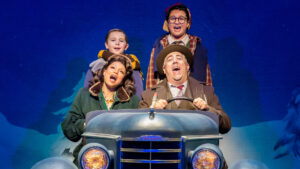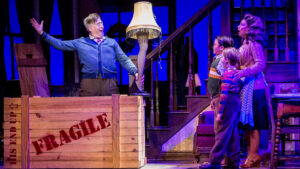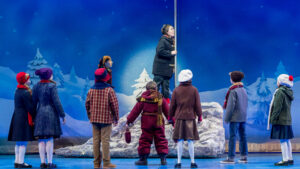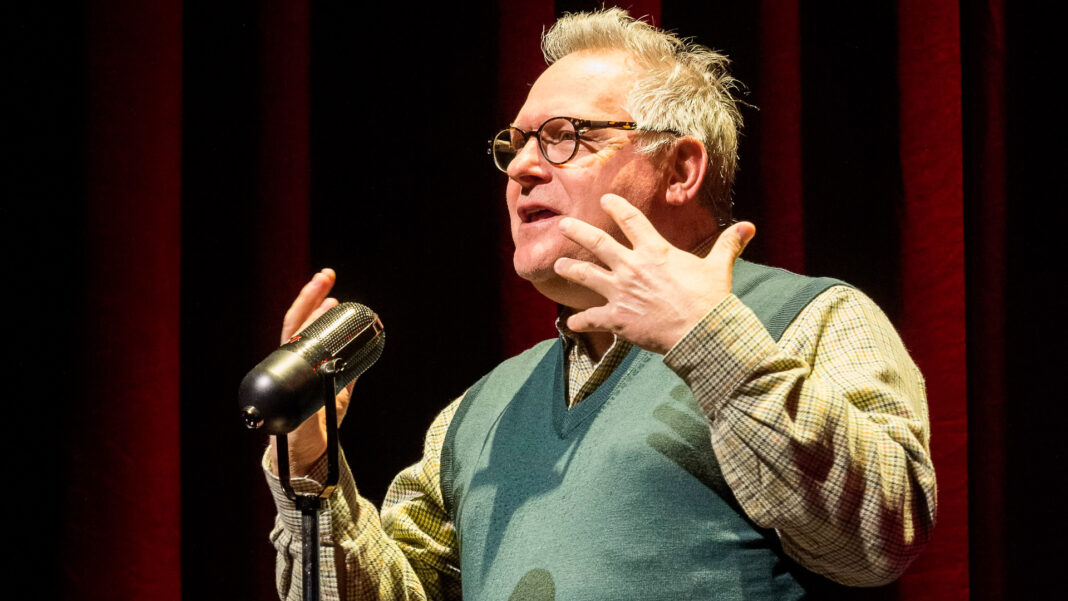Every year around Thanksgiving actors put on the big white beard and the red suit to play Santa Claus at shopping centers and malls around the country. At about the same time actor Chris Carsten is getting ready to once again step into the shoes of Jean Shepherd in A Christmas Story, The Musical.
For the first time since this musical debuted (in its present incarnation – see below) in 2010, the words and music of Benj Pasek and Justin Paul (La La Land lyrics; Dear Evan Hansen) will be heard in Los Angeles. The show officially opens on December 8th at the Ahmanson Theatre where it will play through December 31st.

Carsten’s role of Jean Shepherd reflect the name of the man whose childhood stories informed the 1983 film about a boy in the 1940s whose one wish for Christmas was to receive a Red Ryder toy BB gun. Shepherd co-wrote the film and served as the off-screen narrator. For the musical Carsten is very much on stage. Lurking in corners of scenes. Watching from a far. Often center stage.
It’s a role Carsten has been playing off-an-on (due to the seasonal nature of the show itself and the pandemic) since 2014. That was the starting point for my conversation earlier this week with the actor.
What follows are excerpts from our conversation that have been edited for length and clarity. To see the full interview, please go to our YouTube channel.
Q: In Jean Shepard’s A Christmas Story, the book that inspired the beloved film, he wrote, “As the old truism goes, every man has his chance, and when yours comes, you would better grab it.” What do you remember most about your auditioning and casting process to become a part of the ensemble of this musical in 2014?
Carsten: I remember the competition. I was up against very talented gentlemen, Chris[topher] Swan and he eventually ended up getting the part. I had a pretty good working relationship with [Executive Producer] Dan Sher at that time, and we’ve known each other a long time. I figured they would find out some way to work me in. It was a fun process.
It was a little difficult because the original cast album of A Christmas Story is not what we do today. The material we were getting was different than what we’ve been rehearsing with and practicing by listening to the original cast album. But it was still a lot of fun. It was challenging, but a lot of fun.
The character was off-camera in the film and now on stage in the musical. How do you approach Jean Shepherd?
I’ve always kind of patterned it after Jean Shepherd’s energy in the film because you never see him. But in the musical, you see the narrator throughout the entire stories weaving in and out of the sets. That’s a different dynamic than the film. So you have to go by his energy, which is wonderful and infectious. Not that I was trying to do an impression of Jean Shepherd, I certainly develop my own take, but zeroing in on that energy that he captured during the film is what I’ve tried to base my performance on.
How was your relationship to the show evolved since you first became a part of it?
Every incarnation that we put together is different. It’s the same material, but you’re bringing in different people almost every time. The kids are always going to be different because they grow and change – even though several years ago we brought in some of the same kids the next year because they still fit the physical requirements, they looked young enough. The people are going to be different and you’re going to get a different interpretation and a different response. That’s a wonderful, delightful challenge because it keeps your mind sharp.
What do you think it is about this story that resonates with you personally and that also resonates with audiences? And I’m assuming they may not necessarily be the same thing.
A Christmas Story, when it first came out, to my understanding, it wasn’t that well-received by critics. I don’t think it was a startling commercial success, but over the years developed a loyal following with the marathons every Christmas and everybody watches it. I am certainly one of those people. There’s a uniqueness to this story that you don’t find that often in other Christmas stories. Here’s a slice of Americana and I think people identify with it on a large scale because people in this country, when they grew up as kids, they all had a special gift that they wanted and I think they can latch on to that.

One of the things that our director, Matt Lenz, says about his approach to the show is, yes, it’s stressful. You want to get all these things done. It’s Christmas time. Rush, rush, rush, rush. But [we] wouldn’t have it any other way. He constantly reminds all of us that that’s the joy we’re trying to latch on to. I think A Christmas Story captures that because there’s so much to be exasperated about: from the leg lamp to the kid sticking his tongue to the flagpole. All these crazy things going on and yet we wouldn’t have it any other way.
As I’m sure you know, Pasek and Paul were not the original composers/lyricists for the musical. There was another composer who was on it when it had its world premiere. But a year later, Pasek and Paul had come in and the show debuted in Seattle in 2010. Given what you know as a performer about Pasek and Paul and their work, what do you think they do that’s so right with this show in terms of expressing it through their songs?
I’m not sure why it didn’t work out. But we find two extremely gifted artists in Pasek and Paul that found a way to bring the story to life. My own opinion is that when you watch the film of A Christmas Story, it almost seems like it’s tailor made to be made into a musical. When Ralphie goes into his daydreams there’s this different world that’s created. When I watch that, I say, Yes, you could make this into a musical – just find the right guys to put it to music, adapt it however you need to adapt it. This lends itself to a different kind of expression and that other expression is in the musical form. Pasek and Paul are extremely talented and they probably easily found ways to create and make this musical just soar.
Their lyrics align easily with Jean Shepherd’s material. It feels like it has the same rhythm and cadence as Jean Shepherd did.
He had a great way with words. And I think if you’re going to attack a project like this, if you’re Pasek and Paul, you certainly have to pay attention to that rhythm. You certainly have to pay attention to the way he tells a story. His viewpoint is very interesting, unique and different. When you have that to go by, it can open up creative avenues.
I think they really paid attention to Jean Shepherd’s style, his vision and used that to help guide them along the way. As well as their own style and vision, of course, to make it their own and brought it to life. The results are they speak for themselves. It’s been a really fun ride.

It does feel like there is a certain nostalgia for a simpler time when all a kid wanted was a BB gun as opposed to these weapons of mass destruction that have been used on high school campuses and other places around the country. Do you feel like A Christmas Story reminds us of what life was like when it was simpler? When we didn’t have so many things that we could be angry about? That a boy’s desire for a BB gun was just because it was a BB gun and not because it was anything more than that?
It’s something that, even since 2014, you have to be delicate about. If you’re going to talk about a gun, you need to be clear that it’s a different connotation now than it was back then. You have to be sensitive about that. I think the powers that be, the artistic people, are making subtle, small changes to make sure that we’re not talking about a real gun. We’re talking about a child’s present – a toy gun. We want to make it clear that there’s a distinction, especially in the light of what’s been going on in this country. It’s important that we make that distinction because the story is so wonderful. We don’t want to lose that wholesomeness. We don’t want to lose that simplicity.
On that recording you mentioned earlier in our conversation, and I don’t know if this is still the same way in the show, Jean says in the final scene about parents that it was “their job was to raise you. Your job was to listen.” He then reveals that the best part of the gift was that it was from his old man. How much does a line like that reflect both your own childhood and your role as a father of three daughters?
When we get down to that moment at the end of the show and we talk about how what that means to Jean Shepherd and what that means to Ralphie, I think it’s so well written that those emotions are there. They’re truthful, they’re real, they’re honest.
When I align it with my own life it becomes very special for me. I didn’t get to spend a lot of time with my father growing up because of the dynamics of my parents’ relationship. Even though my dad wasn’t around a lot, I still loved him deeply, truly and fully. The times I did get to spend with him are times that I treasure. But I also feel the same way about my mother. The parental relationship that we explore in this production is so wonderful. But when I get to that moment at the end, I’m contemplating my own life, my own relationship with my parents, the emotions that come to me. They’re always there.
I would assume it gets you thinking about what your own relationship is now that you’re in the father role.
Yes, absolutely. I’m hoping my kids, when they become adults, that they’re going to be able to look back on their lives and remember times when their father made a difference for them and their mom, too. I think most people, if not everyone, would really like to have a worldview that their parents influenced.
I tell people that are questioning becoming parents, if you become parents to children, it is your chance to leave a little bit of yourself. I’m a product of not only my parents, but their parents, their parents before them and before them and before them. It goes all the way back. Who we are today, there’s little pieces of all of that. Little pieces of all that that represents who we are through the eons of time that human beings have been around.
To watch the full interview with Chris Carsten, please go here.
Main Photo: Chris Carsten in A Christmas Story, The Musical (Photo by Craig Schwartz Photography/Courtesy Center Theatre Group)











